We present an extract from Two Dozen Eggs, the debut book by cook Hugh Corcoran, with illustrations by Peter Doyle.
Hugh is a cook from Belfast who has spent the most part of the last decade living and working in the Basque Country and France.
Subtitled Pocket Stories For Cooks, Two Dozen Eggs is a pocketbook collection of his short stories and recipes. Written over the period of a few months, the stories contained within are based on the memories and experiences of those places and his childhood in Ireland.
Ticket Inspectors
For Inshaf
The street lights lit the dark, empty streets as Inshaf sat inside the bus with his head resting upon the window and watched the stops pass, eagerly anticipating his own. He wore a baseball cap and his hand bore a plaster which he still had from when he cut his hand at the beginning of the week. He was on his way home after a long day. Every day was a long day for him. He began in the morning and left late at night. There was a break in between for a few hours but his house was so far away in the suburbs that there was no point in going home, and he thought he would be better spending the money on something else than travelling around in the metro. He had arrived in Paris just a few months ago and still didn't speak any French. He got by in English but each day was still a huge effort to learn everything he was taught in the kitchen and try to understand the French spoken all around him. A local girl, around his age, had offered to help him. He sat with her most afternoons between shifts and bought her a coffee in exchange for some French lessons. She wore her hair short, with a long fringe, she was in her early twenties, pretty and curious about him. He accepted her kindness and interest. Although he had been a handsome young man to the girls back home, no French women had shown any interest in him until she had. So each afternoon he sat with her and spoke about the most basic of French vocabulary and, often, asked her would she like to go out some time for a drink or dinner with him, which she always bashfully declined. He could never tell whether it was pity or attraction which motivated her, he wasn’t willing to probe too much, for fear of losing her.
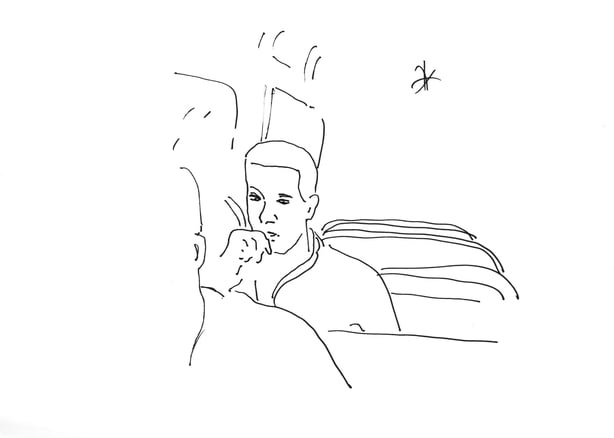
As he sat sleepily on the bus he imagined his leg being warmed by a human hand, but it was just the curry he had made for staff meal and was bringing home for dinner. It had been a long journey home. The metro had broken down and everyone had been moved onto a bus in that late hour and, not knowing French, he had followed everyone towards the bus. The bus pulled up at the next stop and two inspectors boarded.
'Tickets please,’ the inspector said impatiently. Inshaf handed over his metro ticket casually.
‘This is not a bus ticket.’
Inshaf didn’t understand at first. He wondered what the problem might be. He stood looking at them in panic. A woman near him explained in English to him that he needed a bus ticket. He explained in turn, to the inspectors, although they made no sign as to the fact that they understood what he was saying, that the metro had broken down and that he was transferred onto the bus. They shook their heads when the translation came through.
‘Fifty euros please.’
‘Fifty euros? I can’t pay fifty euros.’
‘Fifty euros now, or you’re off this bus.’
He sighed. It was late, almost one o’clock. He had work at nine the next morning. He looked at the woman who had interjected for help. She looked back apologetically. Just then a man interrupted from another seat.
‘For god’s sake leave him alone, he clearly didn’t understand. We all just want to get home.’
'This is not your concern, sir,' said one inspector. ‘Fifty euros! How would you like to pay?’
‘I’m sorry, but this is so much money for me. It’s a day’s wages.’
‘Cash or card, sir?’
‘Cash.’ Inshaf handed over the fifty euros from his wallet. He still wasn’t working legally and was paid by the day. He had just been given it by the manager at the end of his shift. The inspector thanked him and placed the money in his wallet and moved on.
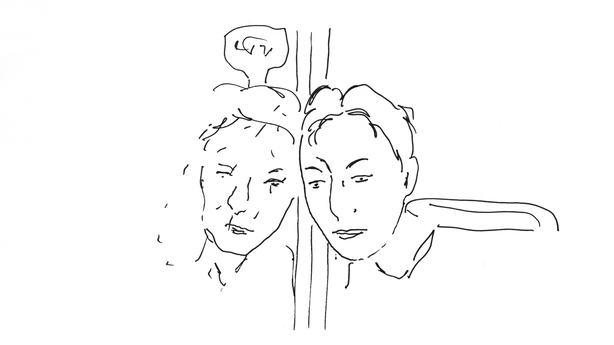
He hadn’t understood, he explained again to the woman, but she was no longer interested.
It was over. He had lost his day’s wages. He looked down at his curry. Lamb. He would at least enjoy that when he got back home. He began to do calculations in his head. How much will I earn if they take me every day for the next two weeks? Maybe I can stop the French lessons, then I won’t have to buy the coffees. That will save me six euros per day. I’ll have the fifty euros back in just over a week.
And so Inshaf rested his head back against the window and tried not to fall asleep and miss his stop again. And for the next week he cancelled his French lessons, but he was too ashamed to explain that he didn’t have the money to pay for it, so he told her he had other things to do and the girl was hurt, he could see it in her eyes when he spoke to her in the café the next day. Then she laughed and explained that it was fine and that she also had plenty of other things to be getting on with and that maybe they should just leave the lessons altogether. He reluctantly agreed and that was the last day they met. He saw her, a few weeks later, smoking a cigarette outside a bar and kissing a boy; he put his hood up and quickly walked on, crossing the road so to avoid them. The rain had just started falling, the lights of the bar glowed orange and the couple were protected from the rain by the awning. He ran for cover, not wanting to get soaked on his way home, a man asked him for a lighter, he still didn’t understand.
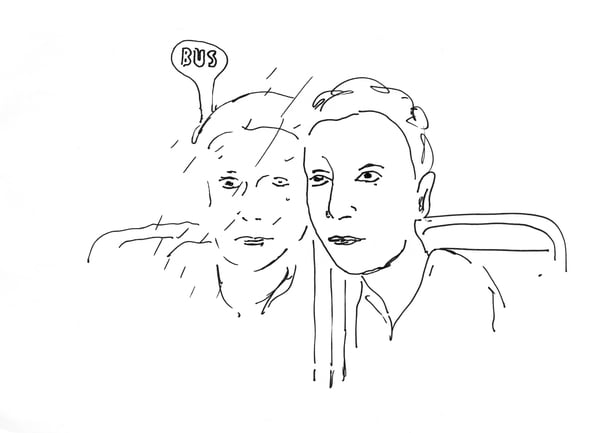
Recipe: Lamb Curry
This is a Sri Lankan-style curry I learned from dishwashers and cooks I have worked with in Paris. Make a masala in a mortar and pestle with (all toasted) coriander, cumin, fennel seeds, fenugreek, cloves, cardamon and mustard seeds. Add fresh green chilli, ginger, garlic, turmeric and red chilli powder. Add salt and some neutral oil to loosen the mixture as you pound.
Rub this mixture on the lamb, either chopped into small or large pieces, or neck on the bone. Leave to marinate overnight in the fridge.
The following day let the lamb come to temperature by taking it out of the fridge some hours before cooking. Sauté some diced onions for around 30 minutes in ghee or sunflower oil. Then add the lamb and turn up the heat slightly. Add water, enough to just loosen a sauce which the meat can cook in without sticking, and reduce the heat.
To the sauce add lime leaves, a cinnamon stick, bay leaves and curry leaves. Simmer on a low heat until the lamb is tender.
The Tide, a Bar on a Saturday Afternoon
It wasn’t a warm day, but it was one which was rid of rain and cold winds and so a good one to
sit outside of O’Connell’s bar and watch the heron in the estuary across the road. Sadhbh wore her cardigan and searched for her glasses while she opened up her copy of the Irish Times weekend edition. Her glasses, of course, were hanging around her neck where she’d left them. She sipped her pint and glanced lazily at the articles, which she thought of as under-researched and akin to some professional gossip, but she could never shake the habit of reading the papers, it gave her comfort, like her other habit of sipping a pint in the afternoon of a Saturday.
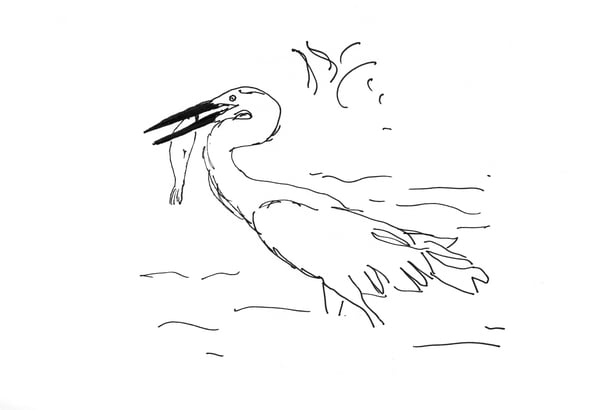
Across the narrow two-laned road she saw the quiet estuary and some moored fishing boats sitting as still as the water. And what may come now, she thought, as she watched the seagulls hunting for something in the sand, or perhaps for discarded fish and chips. She had woken up early that morning, having finally ended her relationship with her barman friend the night before. It had lasted almost a decade. They both found comfort in each other, respite from the loneliness they felt in the small town. But she did not love him, and neither did he love her. They tolerated each other, and sometimes they dreamed that they might love each other. And on most Saturdays she would wake up in his bed and then make tea and they might
have breakfast together before she left for her home. She saw a seagull making a descent upon a picnic table and took another long sip of her pint, looking back now and again at the newspaper, pretending to be interested while she thought of those mornings making love in his untidy room, rolling cigarettes at the back door and drinking her tea while it rained outside. He was a nice man. He could never equal her intellectually, but he was kinder than her. She knew that she was harsh and could be cruel at times, even with him. Sadhbh was never a woman to suffer fools lightly and she let him know when he was foolish. He forgave her that, and treated her with kindness always, but he could not understand her. For him it was not important to be smart, but to be kind to others.
She was not a particularly good-looking woman; since her late twenties she had been overweight and suffered from eczema on her arms. She was pleased to have someone show interest in her, let alone a handsome barman from the pub up the road. She never did ask him what he found so attractive about her to ask her to stay behind for a drink with him that first night. She was always too scared to ask. But now as she signalled to the girl collecting glasses for another pint and folded her paper in two in order to get a better hold on the thing, she felt wildly free. The last decade was over and a new one only beginning. She did not believe in that nonsense anyway, she thought to herself. Decades and years and tallying up the beginnings and ends of things like some convenient little chart. No, life was much more complex than that. What a silly idea to think that today was a new beginning. If she had been speaking to someone about this, she would have let them know what an eejit they were.
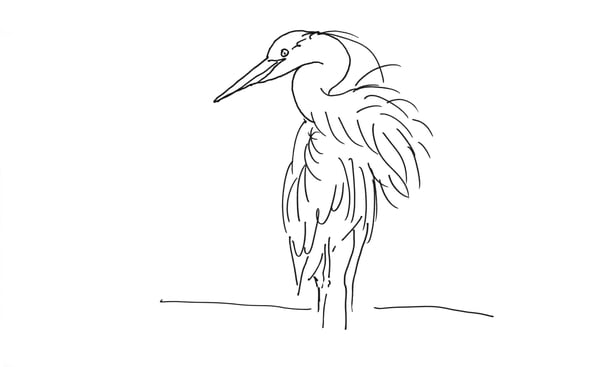
The tide was going out, she could see the water disappearing around the boats, they would be stranded in the muddy sand soon. The tide was something that could be relied on to come in and out, it was circular, not like her chaotic existence. No, her existence was not chaotic, she only wished it to be so. Her existence was as predictable as the tide. On Saturdays she sat here and sipped a pint and read the newspapers. In the evening she slept with her lover. Not anymore. She had changed all that now. She would go home tonight and make a blackberry and apple pie. It was the end of summer and the blackberries were out along the hedgerows and she could take a walk later by the canal and pick them. It is true that she had imagined a more exciting adventure as her next one, but this would be a start.
Van Morrison came on the radio, she loved that song, Linden Arden Stole the Highlights. She downed the rest of the pint and thanked the girl collecting the glasses. Walking down the road she felt a nice hum off the two pints she had drank and a cool breeze which had picked up from the sea. She would make her pie, and then she might take a ferry somewhere. To France perhaps, and have a little holiday, she thought. The idea terrified her. First make the pastry, she told herself.
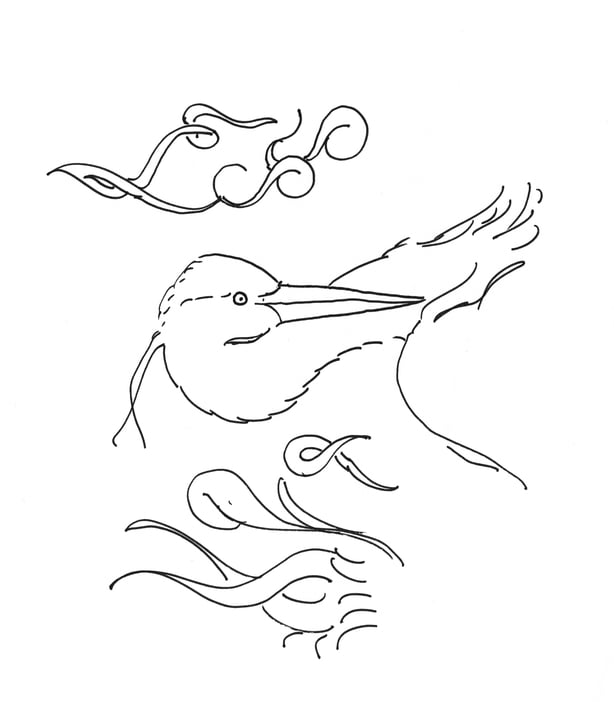
Recipe: Apple and Blackberry Pie
Take equal amounts of flour and butter. Chop the butter into cubes and rub it a little into the flour. It is important to work quickly and keep everything as cold as possible. Have ready a jug of freezing cold water and add this gently until the pastry binds together. Place it in the fridge to rest for 30 minutes.
Remove the pastry and roll it out into a rectangle. Fold it over on itself in three folds so as to create layers. Place back in the fridge for another 30 minutes and repeat. After a last rest, you can then roll it out to fit your pie dish, keeping a little for the lid.
Fill the pie with the fruit, half and half, and sprinkle some sugar on top. Use egg wash to seal the lid on and paint the top with more egg wash. Sprinkle with a little sugar and place in the fridge to cool. Bake in a hot oven (around 200°C) for 45 minutes, gradually reducing the temperature if necessary so as not to burn the pastry. It is important that the pastry sets before the temperature is lowered.
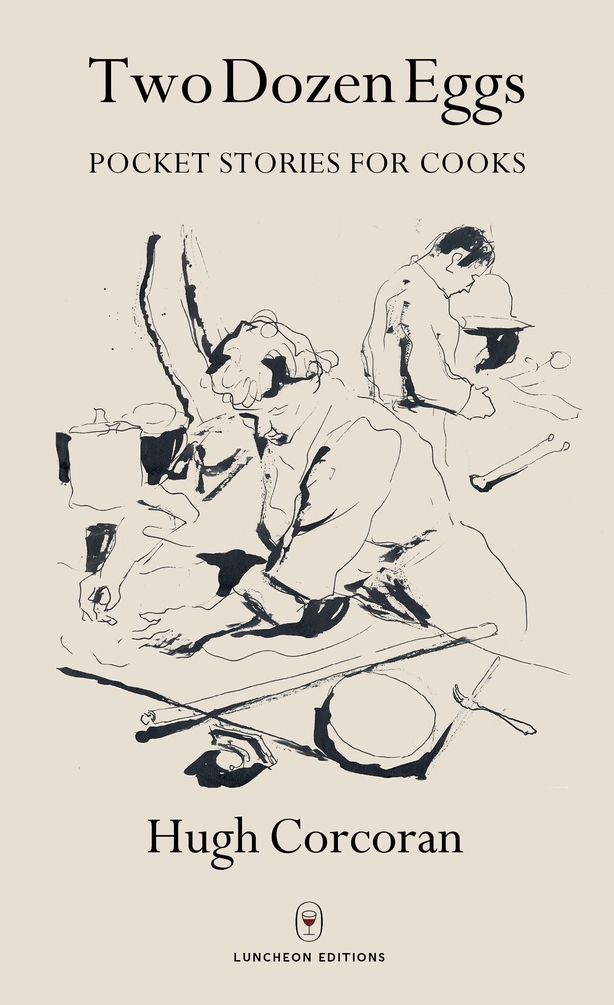
Two Dozen Eggs is published by Luncheon Editions - find out more here.

